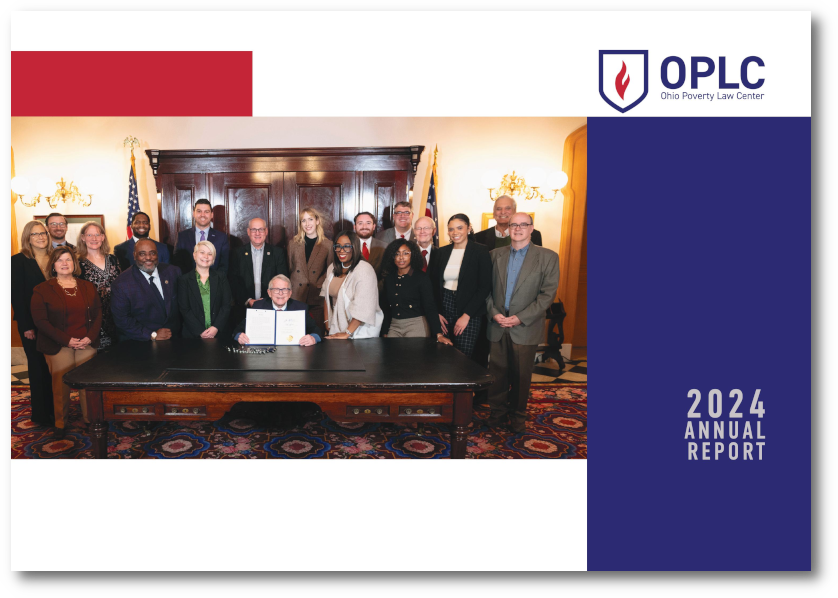Director Susan Jagers Bids Farewell After Years of Advocacy for Low-Income Ohioans
OPLC Director Susan Jagers will be leaving her role, with her last day on March 14. Since joining OPLC in 2018, Susan has been a passionate advocate for Ohioans in poverty, leading efforts that resulted in significant policy and legislative changes to improve the lives of families across the state. Her dedication and leadership have strengthened OPLC’s impact, and we are grateful for her years of service.
Our advocacy won’t miss a beat. Please reach out to the
OPLC team or LASCO Executive Director
Kate McGarvey if you need anything.
OPLC Provides Testimony on Several Budget Provisions
The Ohio House is reviewing Governor Mike DeWine’s proposed budget,
House Bill 96, and is set to unveil its budget plan in the coming weeks. OPLC provided testimony on several issues in three different committees last week.
In
testimony before the House Medicaid Committee, we asked members to remove or change language that would immediately end Medicaid expansion coverage in Ohio if the federal government reduces its share of coverage costs. The language, as written, puts Medicaid coverage for 770,000 Ohioans at risk.
In
testimony before the House Children and Human Services Committee, we asked members to support language that would make it easier and more cost-effective for Legal Aid staff to provide services to older Ohioans. We also asked members to consider removing language that would make it harder for certain temporary workers to apply for Unemployment Compensation benefits.
In
testimony before the House Health Committee, we asked members to increase investments in lead poisoning prevention and to include language in the budget that would allow the Ohio Department of Health to enforce the Renovation, Repair, and Painting rule to ensure safe lead abatement procedures.
Kinship Care Bill Re-Introduced
Senators Hearcel Craig (D-Columbus) and Michele Reynolds (R-Canal Winchester) have re-introduced legislation that gives kinship caregivers more tools to make decisions for the children in their care. Currently, only grandparents can utilize a power of attorney (POA) or a caretaker authorization affidavit (CAA) to enroll children in school or consent to their medical treatment. Ohio is the only state that restricts the use of these important tools to grandparents.
Senate Bill 58 would allow other qualified caretakers to use these tools. SB 58 received its first hearing on February 19 in the Ohio Senate Judiciary Committee.
OPLC is working with Representatives in the House to potentially get an amendment with the bill language added to House Bill 96, the operating budget bill.
Senate Again Takes Up “Anti-Squatting” Legislation
Proposed “anti-squatter” legislation is once again under consideration in the Ohio Senate, now in the form of
Senate Bill 5. Sponsored by Senators Stephen Huffman (R-Tipp City) and Andrew Brenner (R-Delaware), the legislation is very similar to the trio of bills on the same subject that were introduced during the last General Assembly.
Like the previous versions, SB 5 seeks to address “squatting” by expanding the definition of criminal mischief to include unlawfully detaining and causing damage to a property. A property owner with an alleged squatter could file an affidavit with their county sheriff’s office for the immediate removal of the person from the property without a court hearing.
There is a significant risk that legitimate tenants could be wrongfully removed under the proposed law. Such risks are unnecessary since under current law there are no “squatter’s rights,” and much of the conduct sought to be covered by SB 5 is already covered by existing criminal trespass and eviction law. For these reasons, Legal Aid attorneys traveled to the Statehouse last year to provide testimony in opposition to the similar bills in the previous session of the General Assembly.
Currently, SB 5 has only received one hearing for the sponsors of the bill to provide testimony. It is likely to come back for additional hearings, though, and OPLC will continue to monitor it.
OPLC Releases 2024 Annual Report

